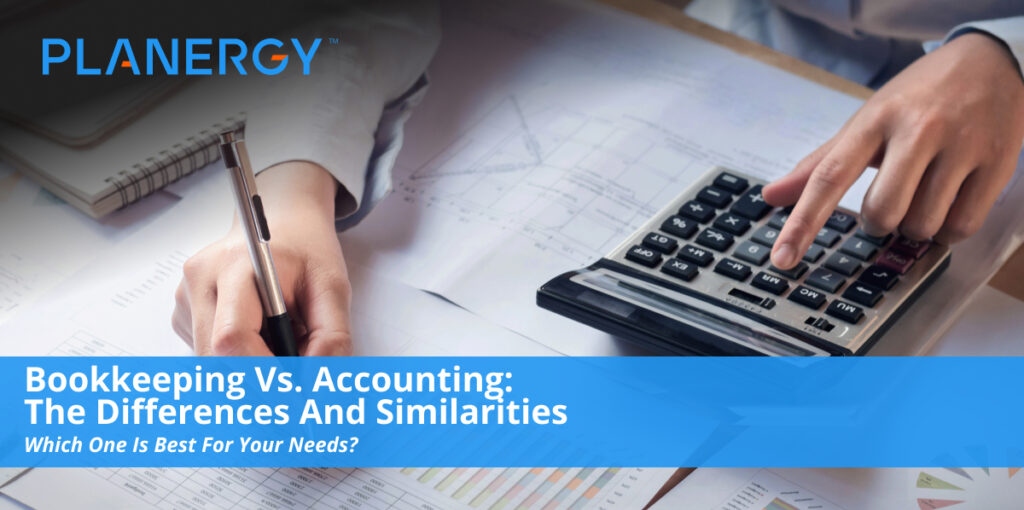Bookkeeping and accounting are essential functions for every business. Bookkeeping refers to recording Financial transactions.
On the other hand, accounting is for interpreting, classifying, analyzing, reporting, and summarizing those financial transactions.
To the untrained eye, both bookkeeping and accounting may appear to be the same.
This is because accounting and bookkeeping both deal with financial data, require basic accounting knowledge, and classify and generate reports based on financial transactions.
However, accounting and bookkeeping are different, and each of them has advantages.
What is Bookkeeping?
Bookkeeping is centered around correctly recording financial transactions related to the business.
Typically, a bookkeeper uses the double-entry accounting method to record all of your financial transactions. Double-entry accounting is an accounting method that means for every debit you make.
What a Bookkeeper Does
A bookkeeper’s primary responsibility is recording financial transactions, but they also handle other tasks important to keep a business running smoothly. These include:
- Recording customer payments: Recording customer payments in a timely manner ensures that the accounts receivable balance remains accurate and you don’t inadvertently send past-due notices to customers who’ve already paid.
- Invoicing: If you don’t send invoices to your customers, it’s impossible for you to get paid. Bookkeepers track sales and write invoices for the goods and services your company provides.
- Paying bills: Organizations must maintain good relationships with their suppliers, so paying bills on time is crucial.
- Organizing and categorizing transactions: Part of this includes reviewing incoming bills for accuracy and preparing them for payment.
- Reconciling bank statements: Reconciling bank statements on a monthly basis reduces the potential for error and provides you with an accurate balance every month.
- Handling month-end adjustments: Bookkeeping software reduces the number of required journal entries, it’s likely there will be month-end adjusting entries to account for expenses such as bank charges, interest expenses, depreciation, and other items that may have been skipped or overlooked.
- Maintaining petty cash: Now that many companies use company credit cards, a petty cash account isn’t as important as it used to be, but if your company still uses one, the bookkeeper has to ensure that the funds are managed and dispersed appropriately.
- Preparing financial statements: Though the accountant is the one who analyzes these statements, they still need to be prepared on a monthly, quarterly, or yearly basis depending on your company’s needs.
Bookkeepers may also be responsible for a number of other tasks including and assisting in budget preparation.
Accountants need solid bookkeeping in order to properly do their job. Some functions overlap, but each serves its own purpose.
What is Accounting?
One reason why many people believe bookkeeping and accounting are the same things is that sometimes an accountant’s job overlaps with the bookkeeper’s job.
The bookkeeper is the one who enters the transaction but the accountant is the one who analyzes that information with accounting principles.
Accountants generally handle:
- Financial statement preparation: Bookkeepers can run standard reports that include financial statements but accountants generally run these reports. if you need an income statement, a cash flow statement, a balance sheet, or any other report deemed necessary, you first go to your accountant. The accountant is the one who analyzes the information within the statements looking at the items such as your monthly income totals and expenses along with the amount of cash your business has available on hands and ways to improve business performance.
- Revenue and cost analysis: Accountants have to understand what two transactions a bookkeeper enters actually mean. The analysis includes everything from calculating accounting ratios if you adjusting the general ledger. Accountants also use historical data to find trends such as product profitability, decreasing revenues, and increasing expenses.
- Financial planning: Accountants know how to look at the big picture. Bookkeepers can spot trends but accountants can provide specific financial advice and information on how to reduce expenses, increase revenue, and make your products or services more profitable. Accountants are also able to advise on issues such as business expansion and business structure.
- Taxes: One of the best reasons small businesses hire accountants is because of taxes. Accountants can help with preparing tax returns, but their knowledge of the IRS, tax deductions, tax planning, and ways to reduce tax liability are what make them valuable. We all have to pay taxes, but accountants can help you pay less.
Differences Between Bookkeeping and Accounting
Key differences between bookkeeping vs. accounting include:
- Management isn’t able to make business decisions based on the data bookkeeping provides.
- Bookkeeping does not require any special skills, where accounting requires highly specialized skills because of its analytical and complex nature.
- The bookkeeping process doesn’t require analysis, but accounting uses bookkeeping information to analyze and interpret data which is then compiled into reports.
- Bookkeepers must be accurate in their work and have knowledge about financial topics but bookkeepers are usually overseen by accountants.
- Accountants who have enough experience and have obtained the appropriate education, generally a bachelor’s degree, can obtain professional certification and work as a certified public accountant or CPA. It’s important to note that not all accountants are CPAs.
- The main objective of bookkeeping is to keep all financial transactions recorded properly and systematically. Accounting’s objective is to gauge a company’s financial situation and to communicate that information with the relevant people.
- There are two types of bookkeeping either single-entry or double-entry bookkeeping. The accounting department prepares an organization’s budget and plans loan proposals.
Which One Does Your Business Need?
In a perfect world, business owners wouldn’t have to choose and would have both on staff.
The majority of small organizations can get by using just a bookkeeper in the early stages because it may be sufficient to manage day-to-day activities.
In many cases, an experienced bookkeeper can perform any of the same tasks as an accountant.
However, it’s always good to have an accountant review the entries, look at your cash flow, and provide feedback on business performance.
Both functions are important to your business is a success. Having an adequate bookkeeping system in place can be enough for many small businesses, but it does not negate the need or the importance of an accountant.
Accounting software like Quickbooks does make the bookkeeping process a lot easier but it requires a different skillset and knowledge of accounting to handle your business.
As technology continues to grow, the landscape of bookkeeping and accounting is shifting and we are starting to see the line between the two fields slowly disappear.
Thanks to accounting and bookkeeping software, some parts of accounting are slowly being added into the bookkeeping process and at the same time, bookkeeping software is now able to generate financial statements that were once part of the accounting process.
Most businesses will still need a bookkeeper to keep track of the books but it will become a lot more than just data entry, balancing bank ledgers, and bank reconciliation.
These functions will slightly decrease in the future and may even become obsolete as most bookkeeping tasks will be handled by bookkeeping software.
Today’s businesses don’t have to worry about keeping either a bookkeeper or an accountant on staff in-house full-time, but larger organizations generally benefit from having accounting services on call.
Small business owners can hire an accountant as needed, as long as they have a solid recording of financial transactions in place. Without adequate record-keeping, both accountants and bookkeepers will struggle to provide accurate and timely information.




